Last Updated on November 22, 2023
The new mystery series, A Murder At The End Of The World, is creating a buzz on social media as audiences connect with the ensemble whodunit from creators Brit Marling and Zal Batmanglij. I had the chance to chat with cast and crew members about the series, including the great Clive Owen. A veteran of everything from the BMW short film series The Hire and Spike Lee’s Inside Man, Alfonso Cuaron’s Children of Men, Steven Soderbergh’s The Knick, and much more, Owen is one of the best actors working today. We chatted about his involvement with the series and what it was like working with Emma Corrin and the great ensemble cast, as well as his upcoming project with Scott Frank. Check out the full interview below.
Alex Maidy: Hi, Clive. Wonderful to meet you. I am a massive fan of yours and have been for years. The Knick and Children of Men are on my list of all-time greats.
Clive Owen: Thank you so much.
AM: Watching this series, I didn’t want to see any trailers. Going in fresh, I knew I wanted to see it because it’s got you, it’s got Emma and Brit Marling, and I knew this would be something I was interested in. And then once it starts, we’ve got this whodunit in one area, one location, even though it’s an intricate location, and it kind of has that feel of some traditional mysteries, but with a different twist to it. What was it that intrigued you about taking on this project?
Clive Owen: It was exactly that. Actually, I did a really sort of classic murder mystery back in the day in Gosford Park with Robert Altman, who was one of the greats at bringing groups of actors together and making it work. So it was really the fresh take on it. I felt that it was hugely ambitious. Brit and Zal Batmanglij were attempting to do a number of things. They were taking a classic genre, the murder mystery, and they were bringing it into a very modern, tech-savvy world. And they were putting a really smart young woman in the lead part, which you really don’t realize until you see it. It helps that Emma Corrin is fantastic and brilliant in it. But you realize you haven’t seen enough young girls taking you through a story like this. It was a real sort of taking tropes that we think we know and then throwing them up in the air and bringing them into something that feels relevant. You know, I’ve got two young daughters, and they see the trailers and go, “This looks cool, and Emma looks cool,” and it feels like that that that they’ve taken a genre that we think we know, and and and they’ve made it fresh and relevant.
AM: Taking something and making it fresh and relevant also means that it’s gotta have some timely subject matter, and you very easily could draw parallels with figures we see today. Did you draw on any of that to create Andy Ronson? Or did you just kind of base it on what was on the page?
Clive Owen: No, it was off on the page. I’ve had many Zooms with Brit and Zal. They would send the scripts as they were writing, and then we would jump onto Zoom and talk it through. You know, there are potential inspirations out there, but I never hooked on any one person. This one was very much sort of script-led.
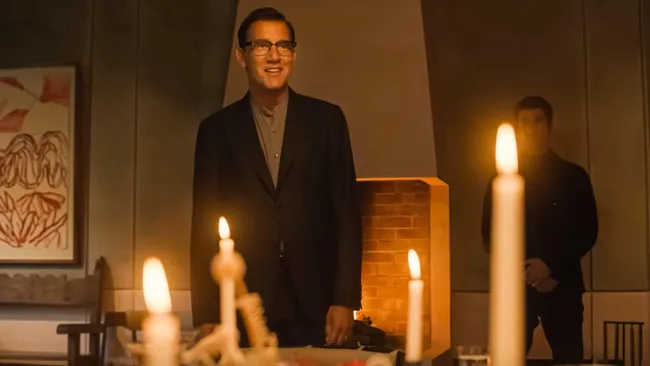
AM: This is a great cast. We have different people who are instantly recognizable, like yourself and Joan Chen. You know the person and are excited to see them in the role. And then we have other actors who may not be as well known to general audiences. What was it like working with this ensemble, as there’s a lot of one-on-one and group work here?
Clive Owen: Yeah, that’s probably credit to Brit and Zal that there was a real sense of community, and, as you say, there were lots and lots of big group scenes. But there were also lots and lots of a lot of one-on-one scenes. But no, all of that worked really, really well. But I think that’s a credit to the team for how they wrote and handled the shooting of it.
AM: And you’ve been involved in big screen projects and the small screen. There are obviously so many great things in your filmography. In recent years on television, you’ve done several kinds of limited series. Those events series are self-contained stories. Is there something that is a different feel when you have multiple episodes to tell a story versus a film? Or do you feel it’s the same as doing any project?
Clive Owen: No, I think because of the time, I mean, you know. I didn’t do TV for a very, very long time, and it was Steven Soderbergh and The Knick that pulled me back to TV, and that was because there was no way I was gonna turn that character and that writing down and doing it with Soderbergh. It just happens; I mean, to be honest with you, I suppose if I look back at my career, I’ve been slightly hesitant to do anything for too long. If I do a play. I don’t like staying in it for too long, you know? I wouldn’t stay in a play that ran for two years. I would want to explore it and move on because that has always been my instinct. But there is something about the time you can take to discover and dig into something on TV in a limited series that I find really satisfying. I went straight from this into doing Scott Frank’s series after The Queen’s Gambit. I’ve just played Sam Spade for him in Monsieur Spade, which, again, is the same length, like six hours of TV, but it feels a substantial, really good amount of time to explore themes and characters.
AM: I’m very excited to see you as Sam Spade! I think that’ll be very cool to see. Looking over your recent projects, you played President Clinton in Impeachment for Ryan Murphy, which was obviously playing a historical figure. You were in Lisey’s Story, which is one of my favorite Stephen King novels, where you’re playing a fictional character. They’re obviously all very different characters. But when you’re playing in this series, where it’s more of that ensemble kind of supporting role, does that change anything in your approach when it’s kind of a part of a larger cast versus being maybe the front lead character?
Clive Owen: No, it doesn’t change a thing. So the truth is you still go in there, inhabit it as best you can, and play it. I don’t change my approach. Whatever work I do, to be honest with you, I approach it all in the same way. You work hard, prepare well, and go in there and do the best you can. There’s no difference. I could see, for instance, on this show that you know Emma had an enormous workload and that when you’re playing a lead part in a series this long. You require discipline and an appetite, and an energy and a sort of rigor. that if you’re not carrying the show, you know, isn’t quite as demanding. So that is a big thing when you’re playing the lead as opposed to a more supporting part but in terms of acting. No, it’s the it’s the same, it’s the same approach.
AM: And from the way that this character was envisioned, was there any thought when you were approaching it that I’m going to play this character as an American or as anything else? Or did you just kind of how did you find who this character was for you?
Clive Owen: That was just as that was a very simple discussion. Brit and Zal, and I talked about it, and they liked me keeping my normal accent, and I was totally comfortable with it. And so that’s the way we went.

AM: My last question for you is that this is. It’s a really intense story. There’s a lot of drama, a lot of heavy material here. I imagine it can sometimes be exhausting performing in something with that emotional depth. What was the feeling like in between scenes? Was it kind of a light atmosphere? Did you have fun interacting with folks, or was it pretty much really intense?
Clive Owen: No, no, I think it’s. I mean, every every act is different. Every environment is different. But you know I’m the kind of actor. I enjoy this work and have fun. You have to know when to concentrate, and when you know you can, you have fun. I’m never over-serious. I don’t carry everything around with me at the same time. I’m super concentrated when you’re actually doing it. But I wouldn’t say it was a particularly heavy atmosphere at all. It was fun, but committed. Everybody worked hard; sometimes doing those heavy, intense things is the best fun. That’s what the fun is.
Alex Maidy: Excellent. Well, thank you so much for your time today. It’s been an honor to talk to you. I love the series and cannot wait for everyone to check it out.
Clive Owen: Cheers! Thank you.
The first two episodes of A Murder At The End Of The World are now streaming on FX on Hulu, with new entries premiering weekly.






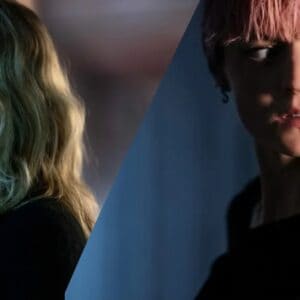
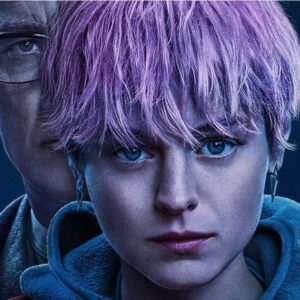
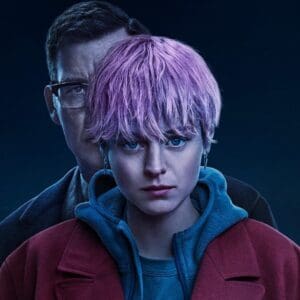




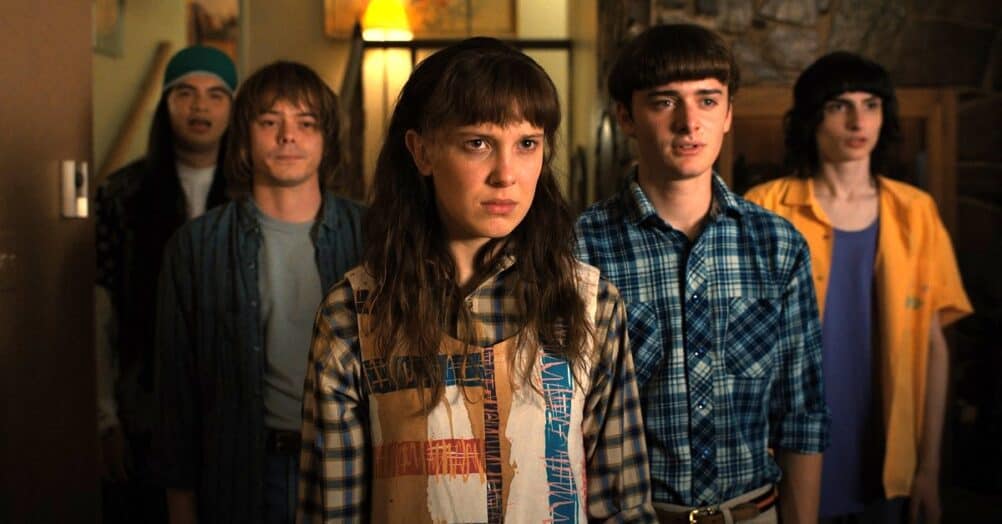
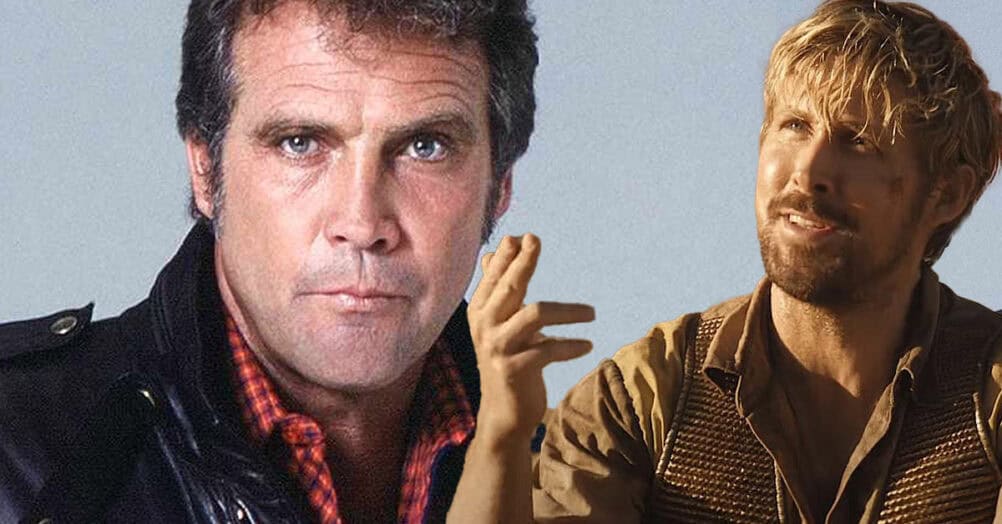




Follow the JOBLO MOVIE NETWORK
Follow us on YOUTUBE
Follow ARROW IN THE HEAD
Follow AITH on YOUTUBE